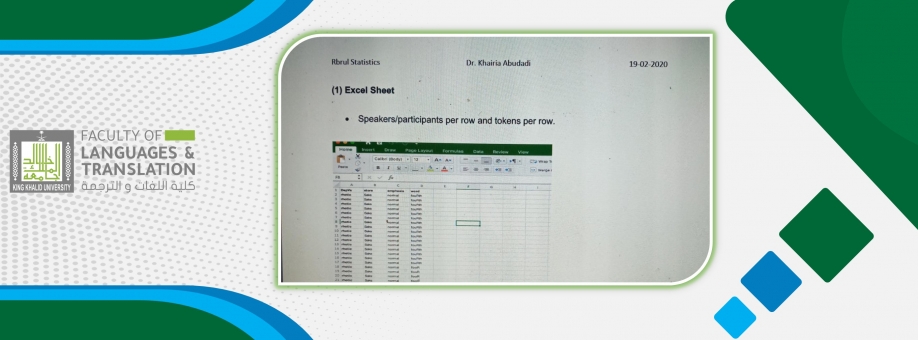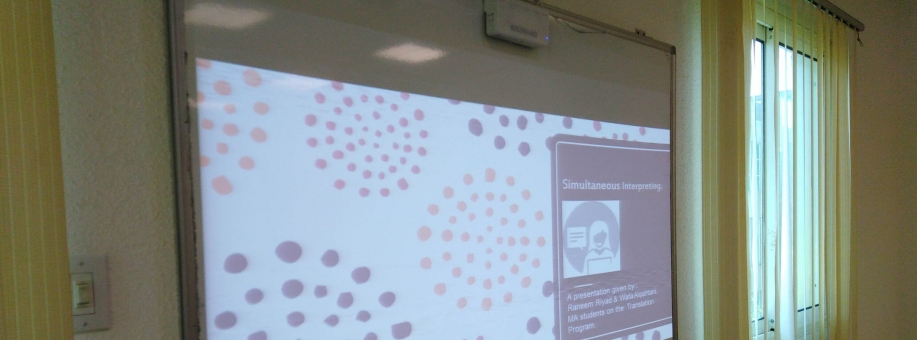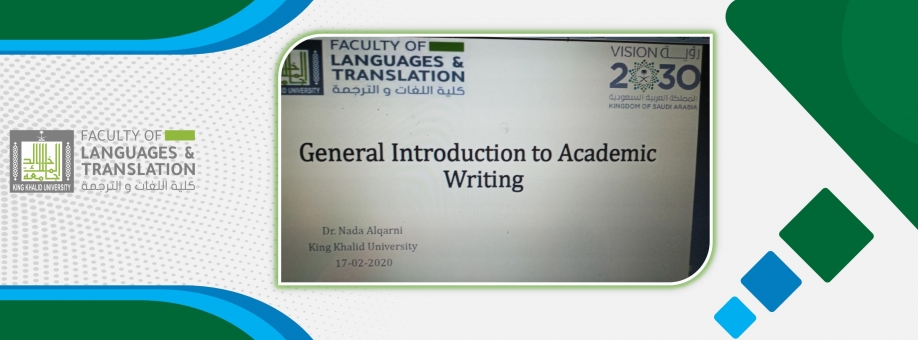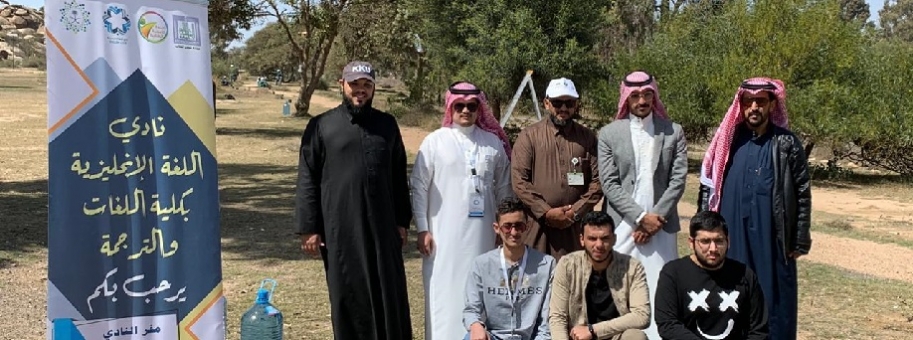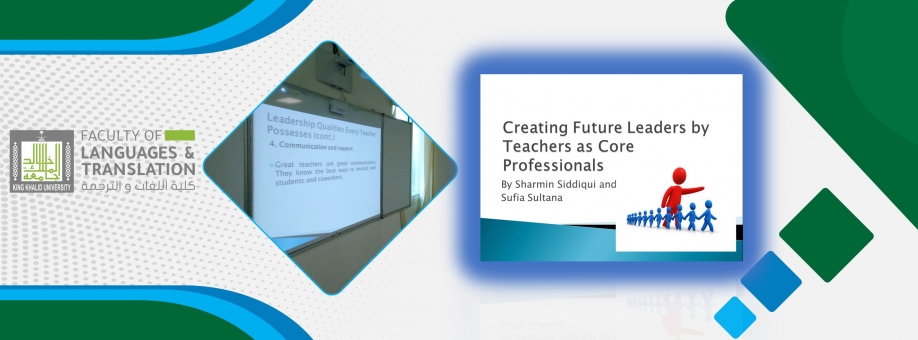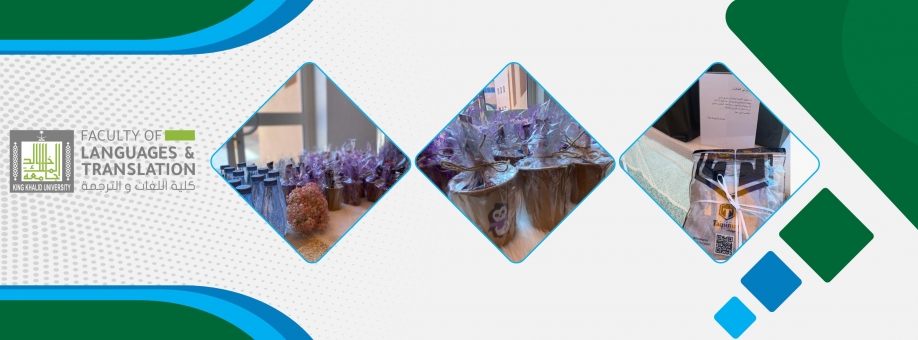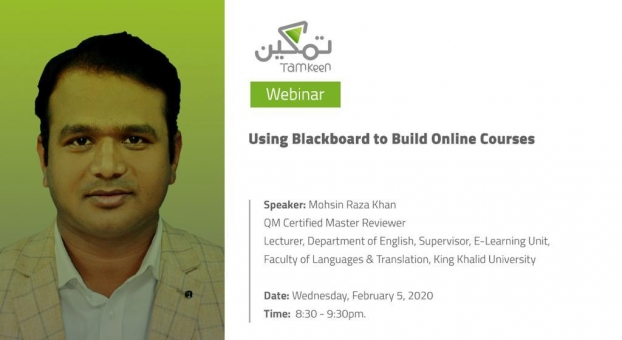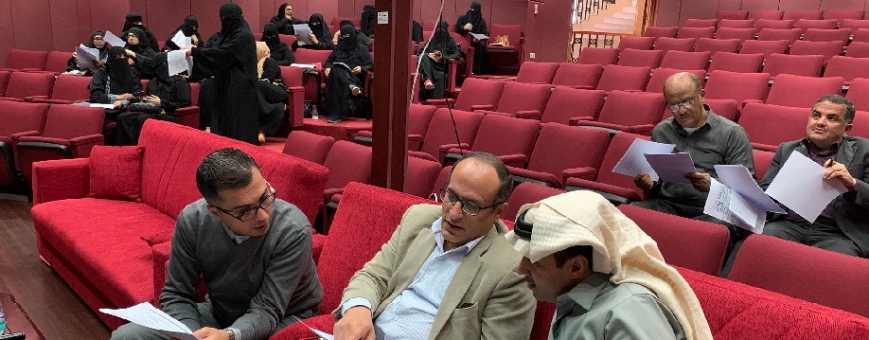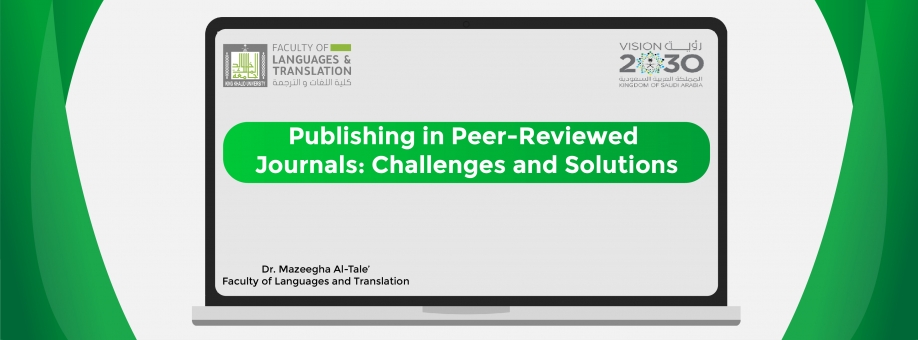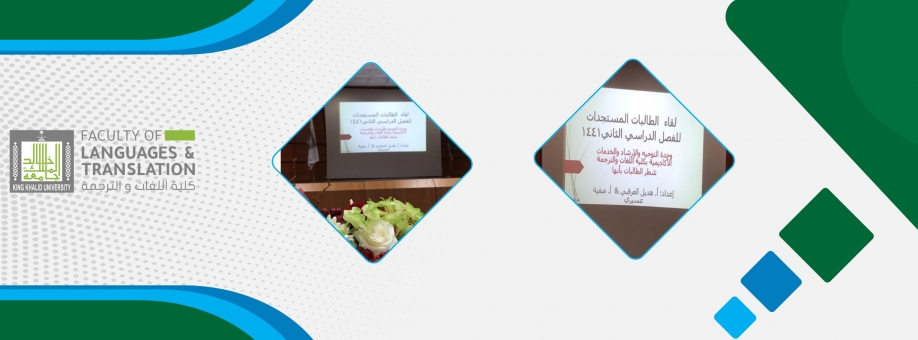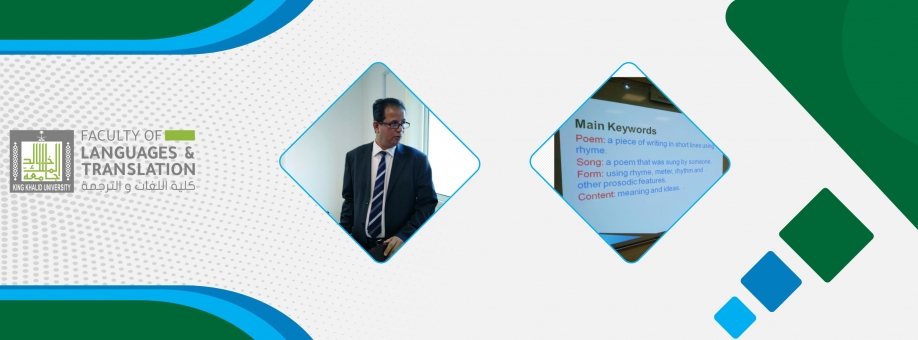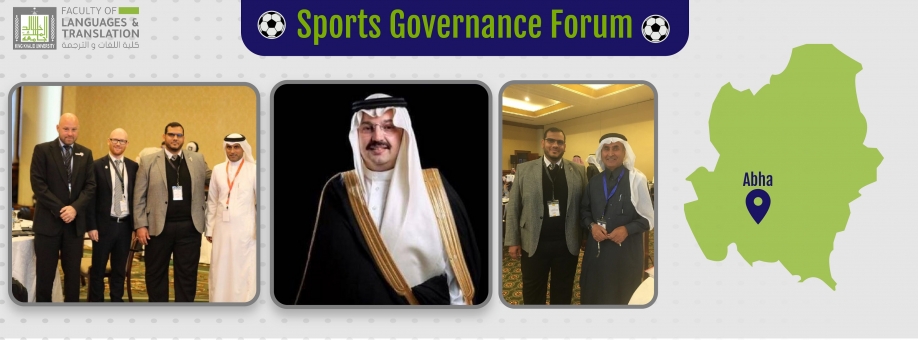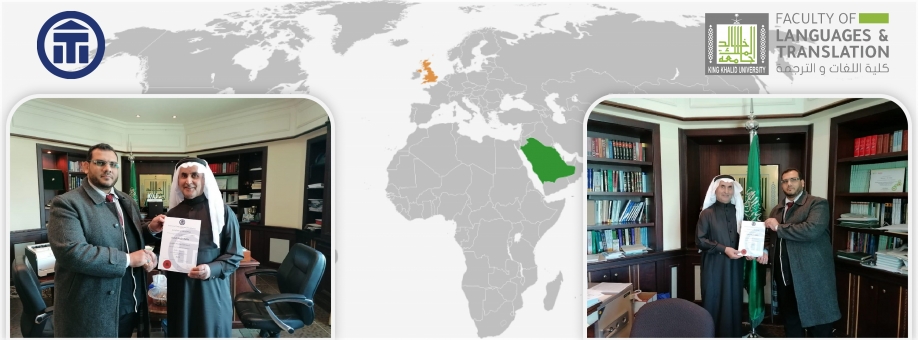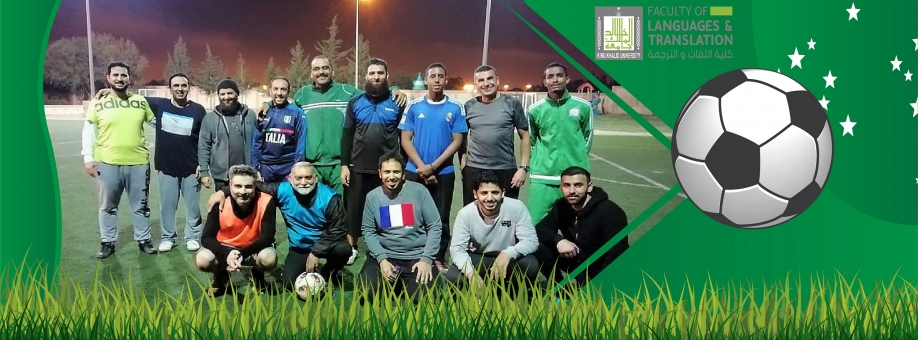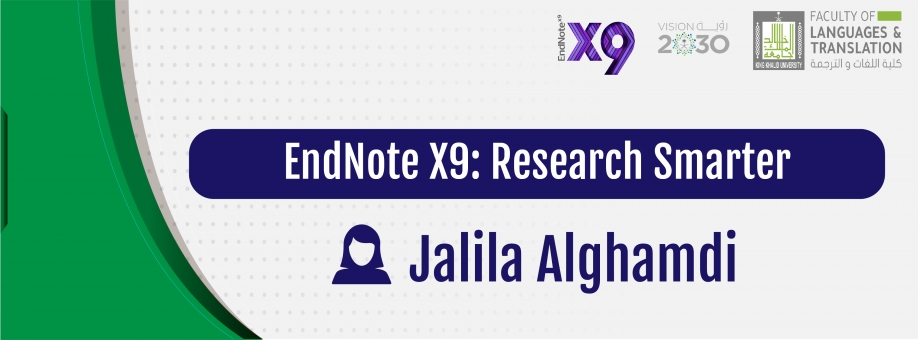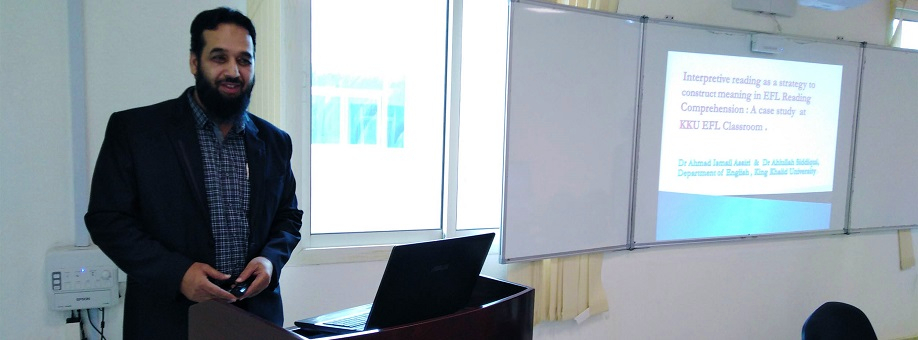News
On Wednesday, February 19, 2020, the Women's Scientific Research Committee of the Bachelor of Arts in English program organized a practical workshop on Rbrul by Dr. Khairia Ali Abu Dady, assistant professor of sociolinguistics.
Dr. Abu Dady started her presentation by reviewing the various uses of Rbrul in conducting different scientific studies. She specifically focused on the significance of the software in sociolinguistics and reviewed some valuable examples.
She then started the practical section of the workshop. First, she guided the participants to the installation steps of the software. Then she worked with them on data files. The workshop was very informative and introduced the participants to the use of Rbrul in conducting scientific research. It was attended by staff members and members of the scientific research committee.
Of noteworthy mention, Dr. Abu Dady conducted a Rbrul workshop during the first semester which was organized by the Language Research Center, where she provided an introduction to the software.
Date: 2/21/2020
Source: Dr. Amal Metwally – Scientific Research Committee Coordinator
On February 19, 2020, there was a presentation titled 'Simultaneous Interpreting' by two Master of Arts in Translation program students named Wafa Al-Qahtani and Raneem Riadh at a seminar organized by the Language Research Center.
Wafa and Raneem first defined 'Interpreting', followed by a detailed explanation of three modes of interpretation. "Interpreting is the transfer of one spoken or signed language into another", said the presenters. They went on further to say that it was IMMEDIACY rather than ORALITY that set 'interpreting' apart from 'translation' because orality usually EXCLUDES 'signed language'.
Simultaneous Interpretation (SI), they said, is the one in which the interpreter listens and renders the entire message in the target language at the same time the speaker is talking. They also talked about some more interesting sub-types of interpretation, such as chuchotage, bidule, bimodal interpreting, and so on. They shed light on the fact that the goal for simultaneous interpreting is NOT to paraphrase but to convey the exact message uttered in the source language.
Wafa and Raneem then talked about how SI originated, and how it is the mode officially adopted at large global organizations like the UN, EU, etc. They stated the working environment for simultaneous interpreters. In a sound-proof booth with direct view onto the conference room, the interpreter listens to a speaker through earphones and simultaneously transmits the message in another language through a microphone to the listeners' room, they added.
Wafa and Raneem, while explaining its salient features, talked about how it saves time and ensures continuity with less distraction and more concentration. They brought to light the skills a simultaneous interpreter must possess, i.e., amazing language skills, specialized knowledge, and cultural competence.
Décalage, EVS (lag time) and Word Order, the main focus of attention of the seminar, were dealt with separately, saying defining the former as the period of time between the source text input and the interpreter's target text. One important issue is that the interpreter has to make a decision on the size of units or chunks he deems suitable to form a meaningful unit to start with, when to start, when to chunk, when to wait or stall and when to start again. In relation to word order as a critical issue in simultaneous interpreting, they said, "Awkward word order is ubiquitous. The Europeans' focus of interest has been on the difficulty of putting German, Russian, Chinese or Japanese into English or French. In these source languages, a verb or predicate which are traditionally seen as the heart of the sentence's meaning and usually come early in English, may be delayed until the end". They brought this issue to Arabic. Arabic deploying VSO order is considered very hard to be interpreted alongside English. Translating an English noun phrase with one noun preceded by 5 or more adjectives into Arabic must start with the noun first and then it lists the adjectives. This poses a challenge and the interpreter's memory is the yardstick on which SI success depends. The example is elucidated by a native, shady, ornamental, high, massive, mature, mighty tree.
The seminar was informative, interactive, and an overall success. The faculty members and the MA students at the Graigor campus also participated in the seminar. Concluding the seminar, Language Research Center Director, Dr. Ismail Alrefaai, thanked the participants and encouraged all other MA students to participate and follow suit. Dr. Eyhab Bader Eddin, swelling with great pride, thanked them for their resourceful content, and for their stamina and courage to have taken to the stage.
Date: 2/20/2020
Source: Mohammad Adil Siddique
On February 17, 2020, the Women's Scientific Research Committee of the Bachelor of Arts in English program organized the first session of the Academic Writing series of Workshops by Department of English Supervisor, Dr. Nada Alqarni.
"Effective academic writing depends on interactional elements which supplement propositional information in the text and alert readers to the writer's opinion," said Dr. Alqarni.
She explained the importance of employing hedging, whose job is to make things fuzzier, implying that the writer is less than fully committed to the certainty of the referential information given. She further illustrated that hedging can be expressed through the use of a variety of structures. Additionally, she explained when to use hedges, emphasizing that their appropriate use is central to developing an academic, communicative competence as it assists the writers in establishing "a relationship with the reader and with the authorities in the field."
Following this introductory section, Dr. Alqarni moved to explain the parts of the academic research paper. The introduction, the purpose of introduction and common mistakes that the authors should steer clear of in writing the introduction as well as the main parts in the introduction were the main ideas covered in the second section. She emphasized that in the introduction authors should establish why the topic is important, outline the past-present history of the study of the topic, indicate the gap in knowledge and possible limitations, state the aim of the paper and its contribution, explain the key terminology in the field of the study and how the terminology and acronyms are used in the paper, and indicate the structure of paper - what is and is not included.
The workshop included practice on the three main parts of an introduction (i.e., the general research area, the gap in the literature and the purpose of the research paper). The workshop was a big success, and it was attended by many graduate students, staff members and scientific research committee members.
Of noteworthy mention, the series of academic writing workshops consists of seven sessions on Mondays 17 Feb to 30 March 2020 at 9:00 am at the Faculty of Languages and Translation, King Abdullah Road Campus.
Date: 2/20/2020
Source: Dr. Amal Metwally – Scientific Research Committee Coordinator
On February 17, 2020, two Master of Arts in Applied Linguistics program students, Alaa Alshehri and Fatimah Abdulaziz delivered a presentation entitled 'Online Research Tools: Discussion and Tips' at a seminar organized by the Scientific Research Committee - Women’s section. The seminar was attended by current MA students and research committee members.
The presentation discussed several useful websites that help researchers to review citations, check grammar mistakes, and check plagiarism. The presenters shared their experience by raising the importance of the English Club in improving students' speaking skills. Alaa and Fatimah suggested that MA students should have their own reading library, which contains articles in their field of research. The presenters appreciated the effort of their professors in effectively helping them and other students during their MA studies and encouraged students to seek their professors' help and discuss any issues that they face during the course of their research.
At the end of the presentation, Alaa and Fatimah advised students to be patient and ambitious toward their goal. They talked about the time when they were stressed during their MA journey, noting that intrinsic motivation is key to student achievement.
Date: 2/17/2020
Source: Banan Hassan Alhajaji, Member, Scientific Research Committee
أقام نادي اللغة الإنجليزية بكلية اللغات والترجمة عملا تطوعيا استمر لمدة ثلاثة أيام تشارك فيه مع النادي التطوعي بجامعة الملك خالد ومع وزارة البيئة والمياه والزراعة.
وفي التفاصيل، فقد قام نادي اللغة الإنجليزية بكلية اللغات والترجمة ضمن أنشطته الطلابية بعمل تطوعي بدأ يوم الخميس الموافق 19/6/1441هـ واستمر لمدة ثلاثة أيام بمعدل ثلاث ساعات يوميا، وذلك بتعليق 50 بيت للطيور على الأشجار وبغرس 50 شتلة من نبات السدر في منتزه دلغان وهو أحد منتزهات منطقة عسير.
وقد تم هذا العمل التطوعي بالشراكة مع النادي التطوعي بجامعة الملك خالد بريادة الأستاذ/ ياسر السالمي وبالتعاون مع وزارة البيئة والمياه والزراعة وبحضور سعادة مدير إدارة منتزهات منطقة عسير المهندس/ مريح الشهراني.
وقد جاء هذا العمل تحقيقا لشعار فريق العمل التطوعي بنادي اللغة الإنجليزية أثر يبقى.
Under the patronage of Dr. Abdullah Al Melhi, Dean, and the supervision of Dr. Abdulrahman Almosa, Vice Dean for Academic Development & Quality, the E-Learning Unit of the Bachelor of Arts in English program organized the 15th E-Learning Awareness Campaign for new students of English Department from Sunday, February 9, 2020, to Thursday, February 13, 2020.
Vice Dean Almosa appreciated the efforts of the E-Learning Unit for organizing the campaign and encouraged students to actively participate in such activities.
Mohsin Raza Khan, FLT E-Learning Unit Supervisor, said that the aim of the awareness campaign was to make new students aware of the necessity and effective use of the King Khalid University E-Learning learning management system (Blackboard).
During the campaign, the E-Learning Unit contacted students in their respective classrooms and imparted Blackboard training. Students were exposed to important Blackboard tools - Announcement, Lectures, Assignment & Tests, Discussion, Blog, Wikis, Course Message, Blackboard Collaborate Ultra, Blackboard Collaborate, and were given extensive training on using these tools.
Students enthusiastically participated in the campaign.
Date: 2/17/2020
Source: Faculty of Languages and Translation
Ms. Sharmin Siddiqui and Ms. Sufia Sultana delivered a presentation titled Creating Future Leaders by Teachers as Core Professionals at a seminar organized by the Language Research Center on February 12, 2020. Their presentation emphasized the importance of building leadership among teachers and transferring leadership attributes to students of the Bachelor of Arts in English program.
The session began with a lead-in task in which the participants were asked to write names of their high school teachers. Ms. Siddiqui and Ms. Sultana focused on the fact that the teachers who had created a positive impression among their students were in general well remembered.
They pointed up leadership among teachers by quoting Richard Dufour who termed teaching profession as the creator of all other professions. They also quoted Wendell Willkie, J.F. Kennedy, Henry Adams and Alexander the Great while talking about the correlation between leadership and learning.
The main points Ms. Siddiqui and Ms. Sultana’s presentation covered were leadership qualities a teacher should possess, leadership styles, the demonstration of leadership in class, teaching leadership skills, and barriers to developing teacher leadership. They highlighted the combination of leadership qualities great teachers possess, and how they can train up the learners to achieve those leadership attributes that they can apply in their lives and profession.
The presentation was informative, interactive and a great success. It is worth mentioning that Graigor male campus also participated in the seminar through video conferencing.
Date: 2/15/2020
Source: Mohammad Adil Siddique
بسم الله الرحمن الرحيم
ولأننا نؤمن بأن العمل التطوعي من أهم أركان الحياة.
فقد قام نادي { The English club } بكلية { اللغات والترجمة } شطر الطالبات ، بالتعاون مع وكالة عمادة شؤون الطلاب لشؤون الطالبات، بافتتاح الفصل الدراسي الجديد بمبادرة تطوعية " كسوة الشتاء" من ضمن برنامج Volunteer Work.
حيث أُقيمت الفعالية يوم الاثنين ١٦ جمادى الثاني لعام ١٤٤١ هـ.
بِدءًا من الساعة التاسعة إلى الحادية عشر صباحًا.
أمام مدخل قسم اللغة الإنجليزية .
-حيثُ قام النادي بتنسيق من عضوات النشاط بتجهيز وتغليف حقائب تحتوي على ( وشاح، قفازات، بيجامة، وكنزة دافئة) وعبارات مترجمة لعدة لغات. بحيث يكون دور النادي تجهيز الحقائب وعلى الحضور أخذ حقيبة وتسليمها لشخص محتاج سواء داخل أو خارج الجامعة، وذلك لتحفيز المسؤولية الاجتماعية وتقاسم الأجر بين المنظمات والحضور. تكللت المبادرة بالنجاح وبحضور ٥٨ طالبة وعددًا من أعضاء هيئة التدريس والموظفات وعاملات النظافة.
رائدة النادي : أ / مرام المالكي ,
رئيسة النادي : سهام العبدلي ,
ضمن أنشطتها الطلابية ، وبرعاية من سعادة عميد كلية اللغات والترجمة الدكتور/ عبد الله آل ملهي ووكيل الكلية الدكتور/ يحيى عسيري أقامت كلية اللغات والترجمة حفلا تم فيه استقبال للطلاب المستجدين في الكلية وأيضا تم فيه تكريم للطلاب المتوفقين في الفصل الدراسي الأول للعام 1440/1441.
وفي التفاصيل فقد أقامت كلية اللغات والترجمة ممثلة في نادي اللغة الانجليزية يوم الثلاثاء الموافق 1441/6/10 الساعة 11:00ص حفلا تم فيه الترحيب والاستقبال للطلاب المستجدين في الكلية والبالغ عددهم تقريبا 150 طالب مستجد. كما تم أيضا تكريم الطلاب المتوفقين الحاصلين على تقدير ممتاز مرتفع في الفصل الدراسي الأول للعام 1440/1441ه وقد بلغ عددهم تقريبا 49 طالب متفوق.
وقد بدأ الحفل بآيات كريمة من القرآن الكريم تلاها عرض مرئي بالأنشطة التي نظمها ونفذها نادي اللغة الانجليزية في الفصل الدراسي الأول. جاء بعده كلمة سعادة عميد الكلية الدكتور عبد الله آل ملهي. وقد رحب سعادته بالطلاب المستجدين وحثهم على الجد والاهتمام والحرص والمواظبة وبارك أيضا للطلاب المتفوقين تفوقهم.
بعد ذلك ألقى المرشد الأكاديمي للكلية الدكتور/ داوود مهدي كلمة رحب فيه بالطلاب المستجدين وبين لهم بعض التوجيهات والارشادات التي يحتاجونها خلال مسيرتهم الجامعية وبارك أيضا بدوره للطلاب المتفوقين.
ثم تحدث وكيل الكلية للتطوير والجودة الدكتور/ عبد الرحمن الموسى عن رابطة الخريجين وبعض أنشطتها وأهدافها وأهميتها للطلاب كما رحب الدكتور الموسى بالمستجدين في بداية كلمته وأنهاها بالمباركة للطلاب المتفوقين.
بعد ذلك كانت كلمة رائد النشاط الطلابي بالكلية الأستاذ خالد القاسمي ، وقد تطرق لعدة أمور ابتدأها بالترحيب بالطلاب المستجدين وحثهم على الجد والاجتهاد والانضباط ، وقد تحدث في كلمته عن نادي اللغة الانجليزية بكلية اللغات والترجمة وما يقدمه من أنشطة طلابية متنوعة ، ثم بين كيفية التسجيل بالنادي وحث الطلاب على المشاركة في الأنشطة الطلابية والاستفادة منها. وأنهى كلمته بالمباركة للطلاب المتفوقين وحثهم على الاستمرار في تفوقهم.
وقد تم في آخر الحفل تكريم الطلاب المتفوقين ومنحهم شهادات تفوق تشجيعا لهم ولزملائهم المستجدين على التفوق والحصول على معدلات مرتفعة في دراستهم.
قائمة باسماء الطلبة المتفوقين (ممتاز مرتفع) الفصل الأول
محمد عبدالله ظافر الشهري
أنس بن محمد بن فاضل الليلحي الشهري
عوض بن ناصر بن عوض القحطاني
عبد الرحمن بن منير بن فلحان المرزوقي البقمي
عبدالعزيز بن علي بن محمد الشهري
فهد عبدالله موسى الزهراني
أنس بن عبدالله بن خضران العمرى
عبدالعزيز بن جبران بن حامد آل سريع القحطاني
ابراهيم بن سالم بن مفرح القاعي المالكي
عبدالإله بن مرزن بن عوضه آل ثابت الشهراني
احمد بن عبدالله بن احمد ال حزمه الشهري
محمد بن سعيد بن منصور آل عباس عسيري
عبدالله بن جحلان بن موسى الشهراني
محمد بن عائض بن ناصر آل الشعبي العسيري
فهد بن علي بن أحمد آل مجود الشهراني
حسن مرعي علي الربعي
عبداالله خالد عبدالله الهازمي
عبدالله بن سعيد بن عبدالله يحيي
خالد بن علي بن سلمان الشراحيلي الفيفي
اسامة بن يحيى بن محمد الربعي
مهند بن محمد بن غرم الله آل سعدالله الغامدي
عبدالعزيز سعيد عبدالله الشهراني
عبدالرحمن بن امحمد بن علي ابراهيم عسيري
ريان بن يحيى بن علي رديف
عبدالعزيز بن خالد بن عبدالعزيز آل عامر
حسن بن عوض بن مسفر الحسني الزهراني
أحمد بن محمد بن أحمد الجندبي عسيري
عوض بن عامر بن حسن ال يعلى الشهري
طاهر علي عبدي أأ
سعود بن سعيد بن جارالله الشهراني
فارس بن أحمد بن موسى مشافي
وائل بن سليمان بن أحمد مدري الفيفي
عبدالعزيز علي محمد الشهري
مشعل بن محمد بن عبدالرحمن البشري
عبدالرحيم بن علي بن عبدالرحمن ال فرحان الشهري
محمد بن سعد بن حمود البحيري القرني
فؤاد محمد فياض حسين
عبدالاله بن علي بن عبدالله ال مداوي القحطاني
عاصم يحي عيسى عسيري
علي بن يحي بن محمد المحجوبي الشهري
عبدالاله بن ابراهيم بن حسين دحموس
عبدالله حسن عبدالله آل ناصر
مهند بن سعد بن مشبب آل صلام عسيري
خالد بن مرعي بن علي آل عوضه الاحمري
فارس ابراهيم عداوي اليحياوي
ريان بن حسن بن جبار الفيفي
سلطان ناصر يحي عسيري
فيصل محمد محمد عسيري
عبدالسلام طاهر عبدالماجد حمزه
For a list of "Alumni" on the "Honors List", please (click here).
Date: 2/10/2020
Source: Dr. Munassir Alhamami
On February 5, 2020, under the supervision of Vice Dean for Academic Development and Quality, Dr. Abdulrahman Almosa, E-Learning Supervisor, Bachelor of Arts in English program, Mohsin Khan, delivered a university-wide webinar titled 'Using Blackboard to Build Online Courses'. The webinar, organized by the Tamkeen team at the Deanship of E-Learning, aimed to explore the effective use of Blackboard and expose participants to the important tools of Blackboard. Approximately 170 faculty members from the numerous faculties registered for the webinar.
Mr. Khan provided an introduction to and the best practices of:
Blackboard course management tools;
The Fundamentals of building online courses using the QM Rubric;
Creating quizzes, tests and assignments;
Using the discussion board, announcement and start here content areas;
Creating online sessions using Blackboard Collaborate Ultra.
The Faculty of Languages and Translation is dedicated to providing specialized training and services to all faculties. The webinar was an overall success and will continue successively in future webinars as a part of the Tamkeen Team efforts. Special thanks to E-learning Deanship Training Manager, Mohammed Jarallah, for his holistic support.
Date: 2/8/2020
Source: Faculty of Languages and Translation
Vice Dean of Academic Development and Quality, Dr. Abdulrahman Almosa, sponsored a training seminar for the Bachelor of Arts in English program titled 'Creating and Assessing Learning Outcomes' on Saturday, February 8, 2020. The event was co-sponsored by the Deanship of Academic Development and Quality. In attendance were nearly 50 course coordinators from numerous campuses. It is worth noting that both male and female team members attended the event at Saudi German Hospital.
Dr. Abdul Wahed Al Zumor began the event by presenting on the purposes and requirements of developing course learning outcomes and the relevance of this move to the educational aspirations of the Kingdom, as stated in Vision 2030. He stressed the need to shift the focus from content-based education to outcome-based education. When comparing both forms of education, Dr. Al-Zumor explained that content-based learning is dependent mainly upon mastery of course material content. In contrast, outcomes-based education goes beyond mastery of content and into constructing knowledge and skills by the students themselves with guidance from instructors. "Outcomes-based education is part and parcel to the SAQF Level 7 Descriptors and the three domains in which they are in," he said. There was a call to action at the conclusion of his presentation to align course learning outcomes and the program learning outcomes with the SAQF framework.
Dr. Eman Alzaanin, Supervisor of the Academic Development and Quality Unit, expounded upon the fundamentals of outcomes-based education. Dr. Alzaanin emphasized the need to create an aligned curriculum where the intended learning outcomes, the learning activities and resources, and the assessment tasks and criteria are all aligned to enhance students' attainment of the intended learning outcomes at the course and programme level. She walked the participants through an exercise designed to activate the ability to spot the extent of alignment between course intended learning outcomes and written assessment tasks. "We do not want students just to learn what they think they will be tested on. By ensuring that assessment tasks mirror intended learning outcomes, the curriculum will be accurately reflected," she noted. Dr. Alzaanin also introduced a checklist to evaluate and ensure the quality of assessment in three phases: designing of the assessment, marking and verification, and review and recommendations. "This will ensure that the teaching activities of the instructor and learning activities of the student are heading in the same direction," she concluded. The end of Dr. Alzaanin's session was quite active, with a proposal put forward towards modifying the assessment structure in use.
The FLT is grateful to the Deanship of Academic Development and Quality for its co-sponsorship of the event and Quality Consultant, Dr. Ahmed Farid, for his brief explanation of benchmarking and measuring course learning outcomes along with assessments. "Thank you all for giving up part of your weekend to attend this most important event. We will begin the process of revising course learning outcomes in the near future," said Dr. Almosa.
The Faculty of Languages and Translation is dedicated to providing excellence in all aspects of its educational offerings.
Date: 2/8/2020
Source: Faculty of Languages and Translation
The Women's Scientific Research Committee of the Bachelor of Arts in English program organized a seminar entitled "Publishing in Peer-Reviewed Journals: Challenges and Solutions" on Monday, February 3, 2020. The presentation, which was conducted by Dr. Mazeegha Al- Tale', focused on highlighting the significance of publishing in peer-reviewed journals, necessary steps, and techniques. At the beginning, Dr. Al-Tale' thanked the Scientific Research Committee for giving her the chance to give that presentation. She extended her thanks to the outstanding researchers Dr. Fakieh Alrabai and Dr. Munassair Al-Hamami for providing her with valuable information about international publishing.
"As faculty members, we strive to publish in peer-reviewed journals. After the hard work of thinking about appropriate topics, designing our studies, collecting the data and going through other steps of writing, we all are eager to see our works in good scientific journals", said Dr. Al- Tale’. Dr. Al- Tale' illustrated that there are five steps that researches have to follow in their journey towards publishing their work in authentic reliable journals. These are: reading towards topic selection, writing the research paper, selecting a journal, editing, and submission. She further explained in detail how each step could be accomplished perfectly towards publishing in peer-reviewed journals.
Dr. Al-Tale' also highlighted the importance of checking the impact factor of a journal before correspondence. Additionally, Dr. Al-Tale' provided a list of good publishing houses and explained the journal selection tools. She also visited some useful websites during the session in order to show the audience how to know if the target journal is listed in Scopus or not, to know whether a target journal is predatory or not, and to make sure that the International Standard Serial Number (ISSN) is a real one.
The seminar was attended by Dean's Assistant, Dr. Salma Alqahtani, Vice Dean, Dr. Mona Alshehri, teaching staff, and students. The seminar was very informative, engaging and such a great success.
Date: 2/4/2020
Source: Dr. Amal Metwally, Scientific Research Committee
ظمت وحدة التوجية والإرشاد بكلية اللغات والترجمة، شطر الطالبات بابها لقاء للطالبات المستجدات و ذلك بحضور وكيلة الكلية سعادة الدكتوره منى الشهري و مشرفة القسم سعادة الدكتوره ندى القرني. وقد بدأ الحفل بكلمة ترحيبية ألقتها أ. صفية عسيري وكذلك التعريف بهيكل الكلية و تحدثت عن وحدة التوجيه و الإرشاد الأكاديمي و خدماتها و حقوق و واجبات الطالبات الأكاديمية و غير الأكاديمية و نبذه عن أهم الحركات الأكاديمية والمعلومات التي تهم الطالبة و نبذه عن لجنة التأديب. ثم قامت أ. هديل العرقبي بالتعريف بوحدة التوجيه و الإرشاد النفسي و الاجتماعي و أهم خدماتها. بعدها تحدثت ممثلة الانشطة الطلابية الطالبة سهام العبدلي نيابة عن أ. مرام المالكي عن النشاط الطلابي وأنواعه واهم أنشطة النادي .
Date: 1/30/2020
Source: Faculty of Languages and Translation
Dr. Adel Bahameed spoke on the subject of Translating Songs and Poems at a seminar organized by the Language Research Center for the Bachelor of Arts in English program on January 29, 2020. The presentation centered on the challenges involved in translating songs and poems.
The main objective of his research, Dr. Bahameed says, was to refresh translation studies with regard to the possibility of translating songs and poems.
Dr. Bahameed, based on his research, describes 'translating songs and poems' as a challenging task. "There has been a long controversy over whether songs and poems can be really translated or not", states Dr. Bahameed. He mentions a famous Arab singer Abu Bakr Salem and a famous Arab poet Hussein Al-Mihdar and how their works have been translated. While translating a song, he adds, the translator must pay attention to rhythm, rhyme, prosody, music and the culture. Some translators, while translating, only focus on forms, and some, on the other hand, give priority to content over form. He states that the translator should preferably be a poet so that he/she can appreciate the poetic text in hand.
Dr. Adel Bahameed concluded that Arabic poems are translatable, but the translation process is complicated. However, Arabic songs are untranslatable because of the extra dimension of music, which is beyond the translator's control.
The seminar was very interactive, engaging, and a great success. It is worth mentioning that King Abdullah Road Campus also attended the seminar.
Date: 1/30/2020
Source: Mohammad Adil Siddique
Under the auspices of Asir Gov. Prince Turki bin Talal bin Abdul Aziz, the Sports Governance Forum was held on Jan. 20, 2020, from 10 a.m. to 3 p.m. at Abha Palace Hotel. The main purpose of the two-session forum, hosted by Abha Sports Club, was to gather key stakeholders from around the Kingdom and from abroad to learn the unique challenges of sports governance, drive new initiatives, and implement coordinated solutions. Faculty of Languages and Translation Dean, Dr. Abdullah Al-Melhi, and Dr. Eyhab Bader Eddin, MITI, were provided with a special invitation. Dr. Bader Eddin was tasked with providing simultaneous interpreting in the two language combination, i.e. English and Arabic. He translated for the Arab guests what was said by the 2 English guest speakers who in turn got the English translation of what speakers said in Arabic, all done simultaneously. At the end of the Forum, Dean Al-Melhi provided consecutive interpreting for the questions posed to the English speakers before the lens of a TV channel.
Dr. Bader Eddin first provided simultaneous interpretation for Director of Risk and Governance at Everton FC, Paul McNicholas. Mr. McNicholas generated a lot of interest with his vast background in the Premier League, the top tier of English Football. Specifically, he manages all of the processes in place to protect Everton FC, a professional football club based in Liverpool, England. Mr. McNicholas's presentation was titled 'The English Experience in the Governance of Sports Clubs'. After, interpretation was provided for Real World Academies Managing Director, James Tucker. Mr. Tucker emphasized the importance of governance in education and sports clubs, citing examples from different academies from different parts of the world like Spain, etc. His presentation was titled 'The Importance of Governance in Education and Training in Sports Clubs'.
The event included a notable selection of speakers that included:
Advisory (Shura) Council member Dr. Muhammad Al-Abbas;
Dr. Marea Al-Habbash from King Khalid University;
Dr Ahmed Al-Hadithi, President of Abha Sports Club;
Advisor to the Chairman of the Board of the General Authority for Sports, Abdulaziz Al-Masaad;
Director of the Internal Audit Office at Dubai Sports Council, Khaled Al-Shezawi;
Dr Muqbel bin Jdei, Professor of Sports Marketing and Development;
Lawyer Fahad Muhammed.
Dean Al-Melhi recognized Dr. Badder Eddin for his community service commitment and asserted that the Faculty of Languages and Translation was honored to receive the task to interpret to a live audience and national broadcast for the guest speakers. It is worth mentioning that simultaneous interpreting is considered a type of interpreting that tops the list of other modes or types of interpreting in terms of difficulty. This is so because the simultaneous interpreter has to master the faculty of splitting senses in that he listens, understands, analyzes and then encodes the source text message in the other language, all in real-time. Simultaneous interpreting is seen as very hard because it involves 3 layers of problems: A) speed with which an interpreter must make decisions regarding lexical choice, grammar usage, etc, B) enormous tension and pressure to keep up with the rapid flow of spoken language, and C) the background knowledge necessary for instant recall, Dr. Bader Eddin mentioned. Last but not least, it is worth mentioning that Dr. Bader Eddin has provided and continues to provide simultaneous interpreting at high-profile events for high-profile dignitaries in Syria, European Union, Kuwait, Oman and Saudi Arabia. Dr. Bader Eddin is technically called 'FREE Simultaneous Interpreter' in that he has NO access to the text or speaker's notes, and the interpretation he provided was performed with NO look-ahead, under severe time pressure and with no safety net. The difficulty of the interpreting mode stems from the fact that the interpreter has little or no chance to look things up or go back on what he has said: the first pass is final. The interpreter has to tune in to the speaker's train of thought, expressing it precisely and as naturally as possible. Although the listeners do not need to know how this process works, they still expect clear and faithful running speech. All in all, the simultaneous interpreter's job is demanding, high-pressure and high-risk.
Date: 1/24/2020
Source: Faculty of Languages and Translation
On September 1, 2019, we reported that Dr Eyhab Abdulrazak Bader Eddin was named a Qualified Member (Translator) by the United Kingdom's Institute of Translation and Interpreting (ITI) in the English to Arabic combination. ITI aims to enhance and continually develop the translating and interpreting profession between government, industry and commerce, the media and the general public. It was founded in 1986 and has grown to 3,000 members and is considered a resource in the industry.
Dr. Bader Eddin is one of only 28 holders of the MITI designation worldwide in the English to Arabic language combination. Considered Sui Generis in his field, Dr Bader Eddin reached new heights by adding a highly coveted ITI qualified combination status. On November 25, 2019, Dr Badder Eddin entered an elite Arabic to English class after his magnum opus portfolio assessment. Of noteworthy mention, there are only three holders worldwide who are certified by ITI in the Arabic to English combination.
For more information on ITI or details published in our story on September 1, 2019, please click the link below.
https://flt.page.link/Institute-of-Translation-and-Interpreting
Date: 1/22/2020
Source: Faculty of Languages and Translation
After overturning the agreement that last Wednesday would be the final match of the Fall 2019 Semester, an enthusiastic FC FLT of the Bachelor of Arts in English program once again thoroughly enjoyed an entertaining game last night on December 18, 2019. Despite having a hapless, Azaad Hayat, aptly labelled as "worse than the worst of the worst ...ever..goalkeepers" by an observant Dr. Mahmoud Radwan, Team Blue still managed to win quite comfortably. This win was largely due to the Blues having three previous " Man of the Match " titleholders in its team. Dr Yahya Asiri, Saqub Aftab, and Dr. Mahmoud Radwan sowed havoc among the clueless Orange team players, as they continually dazzled with brilliant, attacking football. Together with Dr. Abdelhamid Bessaid, Dr. Yahya Asiri, who recently returned from a football training camp in Egypt, was particularly adept at peppering the opposition's goals with accurate strikes. Although everyone on the field, except for the dodgy Blues goalkeeper, qualified for that coveted "Man of the Match" title, the judges were once again forced to disappoint. After carefully considering all relevant factors, it was decided that, despite being on the losing side, Dr. Omer Sultan and Dr. Dimitrios Michael would share the last "Man of the Match" title for this semester. These two lads have been super enthusiastic, and their ball skills have seen tremendous improvement.
Date: 12/20/2019
Source: Azaad Hayat
In an energy-packed night which saw a perfectly full moon substituting for a number of fused floodlights, Team Blue and Team Orange of the Bachelor of Arts in English program faced off in the final match of the semester. Although the guys donning orange once again ran out narrow winners, there was very little difference between the strengths of the two sides. Because all of the players on the field tried their utmost to impress the judges, it is once again a travesty of justice to choose "The Man of the Match". But, after due consideration, Dr. Abdulrahman Almosa and Dr. Mahmoud Radwan narrowly pipped their competitors, to share the coveted title, until next semester. Faisal Alfadhil is, undoubtedly, "The Man of the Year". We owe him much gratitude for his sterling work at King Khalid University. A Real Doer. Both students and staff are going to sorely miss the presence of this wonderful young man when he departs to pursue his PhD in Austalia in a few weeks time. May Allah grant him all the necessary blessings to speedily reach his goals, Inshallah.
Date: 12/13/2019
Source: Azaad Hayat
The Women's Scientific Research Committee of the Bachelor of Arts in English program organized an 'EndNote Workshop' on Wednesday, November 27, 2019. Ms. Jalila Alghamdi tailored the workshop and its objectives to both faculty members and graduate students. Ms. Alghamdi started her discussion by defining EndNote, saying that it is "software for managing bibliographies and references." Ms. Alghamdi explained that "EndNote management software does not only free a researcher from the tedious work of manually collecting and formatting research materials and curating bibliographies, but also gives a researcher greater ease and control in managing references in research groups through providing coordination for the researchers' who are sharing a research paper."
Ms. Alghamdi explained that "EndNote is a tool that allows researchers to organize and keep track of their references." She highlighted the steps for easily inserting references into research documents as in-text citations, or a bibliography in any of a large number of citation styles (i.e. APA, MLA, etc).
The workshop was an orientation to the software's latest X9 version. Ms. Alghamdi provided screenshots of different processes that could be accomplished using EndNote X9. Some of these tasks are inserting references manually into EndNote, inserting author names according to the rules of EndNote, sorting and arrange references in easily searchable groups, activating the EndNote toolbar in Word, and changing the citation style of a research document with a few clicks.
During the interactive Q&A session, Ms. Alghamdi noted that this session will be followed by another practical session in cooperation with the Scientific Research Committee. For the practical session, attendees will need to download EndNote on their laptops to be able to work on the software following her guidance.
Of noteworthy mention, the workshop was attended by faculty members from the College of Science who showed their appreciation to the invitation sent by the Women's Scientific Research Committee to all university faculty members. The workshop was a big success and really made a difference by familiarizing researchers with the use and manipulation of such a significant tool for writing scientific research papers.
Date: 12/3/2019
Source: Dr. Amal Metwally, Scientific Research Committee
Dr. Ahlullah Siddiqui, Bachelor of Arts in English program, delivered a presentation titled Interpretive Reading at the seminar organized by the Language Research Center on November 27, 2019. The presentation was based on a research paper titled "Interpretive reading as a strategy to construct meaning in EFL Reading Comprehension: A case study at KKU EFL Classroom ", conducted by Dr. Ahmad Ismail Assiri and Dr. Ahlullah Siddiqui.
The presentation focused on how effective interpretive reading is in reading comprehension. Dr. Siddiqui highlighted some previous studies conducted by Alsamadini (2009), Al-Jarf (2007), Carrell (1989) and Cooper (1984). The studies, he stated, emphasized the positive correlation between language competence and being able to understand written texts, and how reading helps in vocabulary building.
Dr. Siddiqui related that interpretive reading is the effective communication of thoughts and or feelings of an author to the listener. He then stated the research objectives: to determine whether interpretive reading has a significant effect on students' reading comprehension; to investigate the efficacy of interpretive reading in employing various types of texts; to compare the effect of interpretive reading to that of silent reading and reading aloud respectively; and to suggest ways in which teacher can go about using interpretive reading in their teaching. He, while explaining the methodology, also compared the statistical data of the control group and the experimental group. Finally, he explained in detail the research outcomes. Two video clips were also played, which demonstrated two examples of interpretive reading.
The seminar was very interactive and a great success. It is worth mentioning that the King Abdullah Road Campus also attended the seminar.
Date: 11/30/2019
Source: Mohammad Adil Siddique

